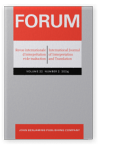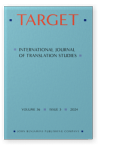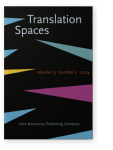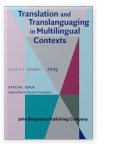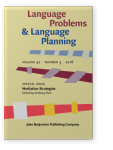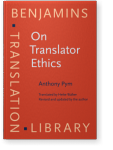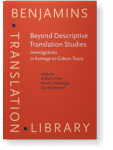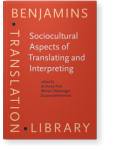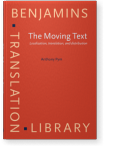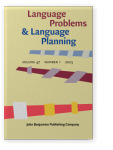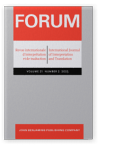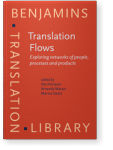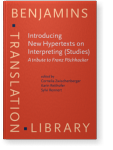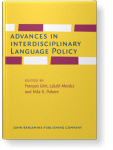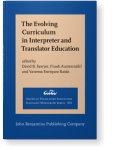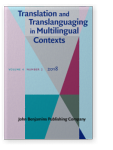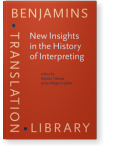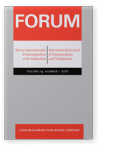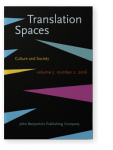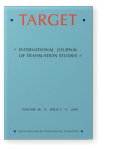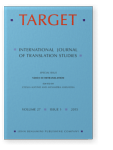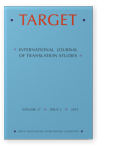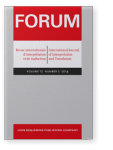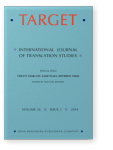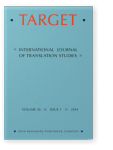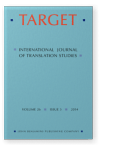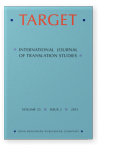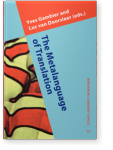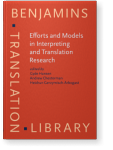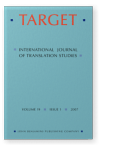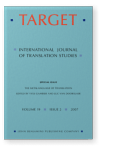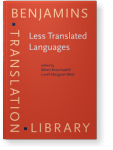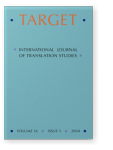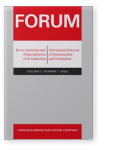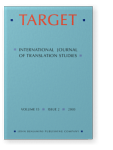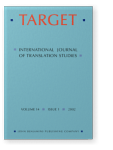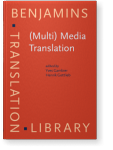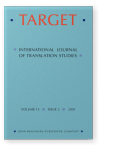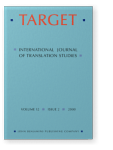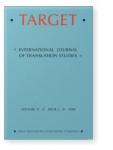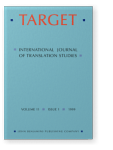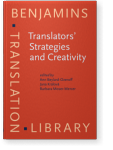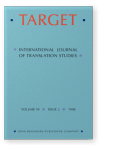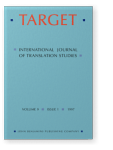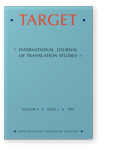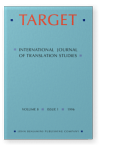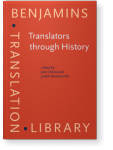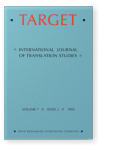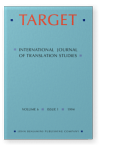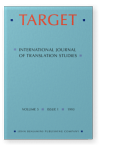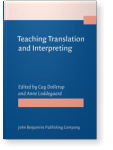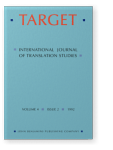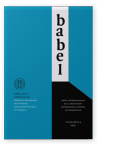Anthony Pym
List of John Benjamins publications for which Anthony Pym plays a role.
Journals
ISSN 2352-1805 | E-ISSN 2352-1813
Mediation Strategies
Edited by Anthony Pym
Special issue of Language Problems and Language Planning 42:3 (2018) v, 110 pp.
Subjects Language policy | Sociolinguistics and Dialectology
On Translator Ethics: Principles for mediation between cultures
Anthony Pym
[Benjamins Translation Library, 104] 2012. xii, 185 pp.
Subjects Translation Studies
Beyond Descriptive Translation Studies: Investigations in homage to Gideon Toury
Edited by Anthony Pym, Miriam Shlesinger † and Daniel Simeoni
[Benjamins Translation Library, 75] 2008. xii, 417 pp.
Subjects Applied linguistics | Translation Studies
Sociocultural Aspects of Translating and Interpreting
Edited by Anthony Pym, Miriam Shlesinger † and Zuzana Jettmarová
[Benjamins Translation Library, 67] 2006. viii, 255 pp.
Subjects Interpreting | Sociology | Translation Studies
The Moving Text: Localization, translation, and distribution
Anthony Pym
[Benjamins Translation Library, 49] 2004. xviii, 223 pp.
Subjects Communication Studies | Discourse studies | Pragmatics | Translation Studies
2024 日本言語政策学会 / Japan Association for Language Policy. 言語政策 / Language
Policy 10. 2014: Illustrations and methodological concerns Target: Online-First Articles | Article
Policy 10. 2014: Illustrations and methodological concerns Target: Online-First Articles | Article
Trade-offs are solutions to translation problems where two or more apparently incompatible values are sought at the same time. As such, they present an alternative to theories that see translation as operating between two polarities of the one value. Analysis of three illustrative examples… read more
2023 Translation policies in times of a pandemic: An intercity comparison Language Problems and Language Planning 47:1, pp. 72–94 | Article
In 2020–22, multilingual vaccination communication became an urgent priority around the world, requiring trusted communication in non-official languages. In Brussels, Melbourne and Shanghai, quite different legal frameworks and language policies were challenged by the need for behavior-change… read more
2023 Choosing effective teaching methods for translation technology classrooms: Teachers’ perspectives FORUM 21:2, pp. 190–212 | Article
Although it is generally agreed that translation students need to learn how to use translation technologies, there would appear to be less agreement on what teaching methods are most appropriate to achieve that end. In our survey of eleven translation-technology teachers in Australia and New… read more
2023 Chapter 1. A naïve inquiry into translation between Aboriginal languages in pre-Invasion Australia Translation Flows: Exploring networks of people, processes and products, Feinauer, Ilse, Amanda Marais and Marius Swart (eds.), pp. 3–22 | Chapter
Was there translation between Australian Aboriginal languages prior to the European Invasion dated from 1788? The evidence from archeological research and the accounts of early European settlers would suggest that there were no specialized translators as such between Aboriginal languages, no… read more
2023 Non-standard court interpreting as risk management Introducing New Hypertexts on Interpreting (Studies): A tribute to Franz Pöchhacker, Zwischenberger, Cornelia, Karin Reithofer and Sylvi Rennert (eds.), pp. 108–125 | Chapter
Most codes of ethics stipulate that court interpreters should give verbatim renditions, should not have side conversations with the witness or the defendant, and should use the alien-I. However, when we find these maxims flouted by outsourced interpreters working in trials in Barcelona, the… read more
2022 Chapter 12. Portraying linguistic exclusion: Cases of Russian-speakers in the province of Tarragona, Spain Advances in Interdisciplinary Language Policy, Grin, François, László Marácz and Nike K. Pokorn (eds.), pp. 237–256 | Chapter
Social inclusion is often used as an ideal aim in many policy statements at all levels. The ideal is nevertheless very imprecise and is interpreted in different ways. Here we attempt to define linguistic inclusion from its negation, by identifying moments of felt linguistic exclusion. When just… read more
2019 Teaching translation in a multilingual practice class The Evolving Curriculum in Interpreter and Translator Education: Stakeholder perspectives and voices, Sawyer, David B., Frank Austermühl and Vanessa Enríquez Raído (eds.), pp. 319–340 | Chapter
Understood as a course of instruction that aims to improve translation practice in a space where the instructor does not master all the languages, the multilingual practice class may save money for training institutions but can present serious challenges to instructors, especially with respect to… read more
2019 European Masters in Translation: A comparative study The Evolving Curriculum in Interpreter and Translator Education: Stakeholder perspectives and voices, Sawyer, David B., Frank Austermühl and Vanessa Enríquez Raído (eds.), pp. 75–97 | Chapter
The European Masters in Translation is a network of programs selected because they meet quality standards for translator training. An analysis of 67 programs (from 61 universities located in 21 countries) describes how those standards inform actual curricula. The analysis compares the various… read more
2018 Mediation choice in immigrant groups: A study of Russian speakers in southern Catalonia Mediation Strategies, Pym, Anthony (ed.), pp. 344–364 | Article
An interview survey of 51 members of Russian-speaking groups in the Salou area of southern Catalonia indicates the use of several modes of mediation to solve language problems. Professional written translators tend to be employed for official documents and high-risk situations only, whereas… read more
2018 Where Translation Studies lost the plot: Relations with language teaching Translation and Translanguaging in Multilingual Contexts 4:2, pp. 203–222 | Article
Recent interest in the role of translation in language teaching calls for dialogue between the disciplines of Translation Studies and Language Education. In framing this dialogue, translation scholars would do well to avoid assuming superiority or special knowledge; they would instead do well to… read more
2018 Introduction: Why mediation strategies are important Mediation Strategies, Pym, Anthony (ed.), pp. 255–266 | Article
Mediation strategies are deployed when people use translation, interpreting, lingua francas, intercomprehension, language learning, or any combination of these to communicate in situations where there is more than one language in play. Such choices can be seen as enacting trade-offs between the… read more
2016 Risk analysis as a heuristic tool in the historiography of interpreters: For an understanding of worst practices New Insights in the History of Interpreting, Takeda, Kayoko and Jesús Baigorri-Jalón (eds.), pp. 247–268 | Article
The specificities of the interpreter’s work can be considered in terms of the
way people interact in spoken encounters. Underlying the competing interests
and implicit search for cooperation, there is always the relative proximity of
alternative non-linguistic action. This gives mediated encounters… read more
2016 On the passage of transcendent messages: Johnnies and Mehmets FORUM 14:1, pp. 123–143 | Article
Translation is one way texts are accorded transcendence, understood as material transfer from a site of utterance. Although frequently construed as a quality of texts or auctorial virtue, transcendence is enacted by receivers (including translators) pulling texts across time and space,… read more
2016 A spirited defense of a certain empiricism in Translation Studies (and in anything else concerning the study of cultures) Culture and Society, pp. 289–313 | Article
The scientific method known as empiricism has been attacked in two influential books in Translation Studies. Mona Baker’s Translation and Conflict sees all knowledge as being produced through narrative, thereby excluding the processes of repeated testing and dialogue that can be associated with an… read more
2016 The professional backgrounds of translation scholars. Report on a survey Target 28:1, pp. 110–131 | Article
A survey of 305 translation scholars shows that some 96 percent of them have translated or interpreted “on a regular basis,” with translation/interpreting being or having been a main or secondary activity for 43 percent of the scholars. Translation scholars would also seem to be particularly… read more
2015 O’Hagan, Minako, ed. 2011. Translation as a Social Activity. Community Translation 2.0 Voice in Retranslation, Alvstad, Cecilia and Alexandra Assis Rosa (eds.), pp. 145–153 | Review
2014 Charles Bally and the Origins of Translational Equivalence FORUM 12:2, pp. 45–63 | Article
Abstract/Résumé
Le linguiste suisse Charles Bally, connu surtout pour son travail dans la stylistique comparée et la phraséologie, a pourtant développé une méthodologie descriptive basée sur la traduction et sur l'équivalence fonctionnelle. Les difficultés rencontrées par ses élèves à l’heure de… read more
2014 Translation Studies in Europe—reasons for it, and problems to work on Twenty Years EST: Same place, different times, Boyden, Michael (ed.), pp. 185–205 | Article
As a social and political context for research on translation, the European Union offers pertinent commitments to multilingualism, inclusive territorial democracy, transparent governance and the welfare state, with enough public funding to pursue these aims seriously. All these features concern… read more
2014 Translator associations—from gatekeepers to communities Target 26:3, pp. 466–491 | Article
Analysis of 217 associations for translators and/or interpreters shows that, after the heroic age of the generalist national and international groupings in the 1950s and 1960s, there has been a progressive specialization of associations. In rough chronological order, separate institutions have been… read more
2013 Daelemans, Walter & Véronique Hoste, eds. 2009. Evaluation of Translation Technology Target 25:2, pp. 286–290 | Review
2009 Natural and directional equivalence in theories of translation The Metalanguage of Translation, Gambier, Yves and Luc van Doorslaer (eds.), pp. 81–104 | Article
2008 On Toury's laws of how translators translate Beyond Descriptive Translation Studies: Investigations in homage to Gideon Toury, Pym, Anthony, Miriam Shlesinger † and Daniel Simeoni (eds.), pp. 311–328 | Article
2008 On omission in simultaneous interpreting: Risk analysis of a hidden effort Efforts and Models in Interpreting and Translation Research: A tribute to Daniel Gile, Hansen, Gyde, Andrew Chesterman and Heidrun Gerzymisch-Arbogast (eds.), pp. 83–105 | Article
One of the long-standing debates in studies on simultaneous interpreting would pit “contextualists”, who see interpreters’ performances as being conditioned by contextual determinants, against “cognitivists”, who analyze performances in terms of cognitive constraints that would be the same for all… read more
2007 Apter, Emily. 2006. The translation zone: A new comparative literature Target 19:1, pp. 177–182 | Review
2007 Natural and directional equivalence in theories of translation The Metalanguage of Translation, Gambier, Yves and Luc van Doorslaer (eds.), pp. 271–294 | Article
Equivalence was a key word in the linguistics-based translation theories of the 1960s and 1970s, although its basic mode of thought may be traced back to Cicero and later to the Renaissance theories that began to presuppose languages of equal status. Close inspection reveals that some theories… read more
2006 Introduction: On the social and cultural in translation studies Sociocultural Aspects of Translating and Interpreting, Pym, Anthony, Miriam Shlesinger † and Zuzana Jettmarová (eds.), pp. 1–25 | Miscellaneous
The numerous sociocultural approaches in Translation Studies are generally of the “toolbox” kind, where any number of models and factors may be drawn upon. This situation leaves many doubts with respect to what might constitute a sociocultural explanation, how pertinent factors can be located… read more
2005 The quantitative analysis of translation flows in the age of an international language Less Translated Languages, Branchadell, Albert and Lovell Margaret West (eds.), pp. 27–38 | Article
2004 Propositions on cross-cultural communication and translation Target 16:1, pp. 1–28 | Article
Cross-cultural communication can be characterized by a relatively high degree of effort required to reduce complexity, by relatively high transaction costs, by relatively low trust between communication partners, and by relatively narrow success conditions that create points of high-risk discourse.… read more
2004 Localization and the Training of Linguistic Mediators for the Third Millennium FORUM 2:1, pp. 125–135 | Article
Abstract/Résumé
La médiation linguistique n’a de sens que dans la mesure où elle aide à établir une coopération à long terme entre les cultures. De ce postulat découlent plusieurs conséquences pour l’avenir de la traductologie. En premier lieu, il ne suffit plus de ne parler que de traduction, car… read more
2003 Texts on translation Target 15:2, pp. 337–353 | Article
2002 Esselink, Bert. 2000. A practical guide to localization Target 14:1, pp. 189–193 | Review
2001 Four Remarks on Translation Research and Multimedia (Multi) Media Translation: Concepts, practices, and research, Gambier, Yves and Henrik Gottlieb (eds.), pp. 275–282 | Article
2000 Why Common Ground Is Not Automatically Space for Cooperation: On Chesterman versus Arrojo Target 12:2, pp. 334–337 | Discussion
1998 Lives of Henri Albert, Nietzschean translator Translators' Strategies and Creativity: Selected Papers from the 9th International Conference on Translation and Interpreting, Prague, September 1995, Beylard-Ozeroff, Ann, Jana Králová and Barbara Moser-Mercer (eds.), pp. 117–126 | Article
1998 Note on a Repertoire for Seeing Cultures Target 10:2, pp. 357–361 | Discussion
1998 Gutknecht, Christoph & Lutz J. Rölle. 1996. Translating by Factors Target 10:2, pp. 397–399 | Review
1997 Gauker, Christopher. 1994. Thinking Out Loud: An Essay on the Relation between Thought and Language Target 9:1, pp. 195–196 | Review
1997 Bragt, Katrin Van, Lieven D'hulst & José Lambert. 1995. Bibliographie des traductions françaises (1810–1840): Répertoires par disciplines & Bragt, Katrin Van, Lieven D'hulst & José Lambert. 1996. Bibliographie des traductions françaises (1810–1840): Répertoires et analyses électroniques. Biblio TF: CD-ROM Target 9:2, pp. 360–364 | Review
1996 Venuti's Visibility Target 8:1, pp. 165–177 | Review article
1995 7. Translators and the transmission of cultural values Translators through History, Delisle, Jean and Judith Woodsworth, pp. 191–228 | Chapter
1995 5. Translators and the reins of power Translators through History, Delisle, Jean and Judith Woodsworth, pp. 131–158 | Chapter
1994 Twelfth-Century Toledo and Strategies of the Literalist Trojan Horse Target 6:1, pp. 43–66 | Article
The scientific translating associated with twelfth-century Toledo remains a poorly understood phenomenon. Attention to its political dimension suggests that it should not be attached to the state-subsidized work carried out under Alfonso X after 1250 but is better explained in terms of Cluniac… read more
1993 Larson, Mildred L., ed. 1991. Translation: Theory and Practice. Tension and Interdependence Target 5:1, pp. 123–126 | Review
1993 Febles, Isabel Pascua & Ana Luisa Peñate Soares. 1991. Introducción a los estudios de traducción. Target 5:1, pp. 131–132 | Review
1992 Translation error analysis and the interface with language teaching Teaching Translation and Interpreting: Training Talent and Experience. Papers from the First Language International Conference, Elsinore, Denmark, 1991, Dollerup, Cay and Anne Loddegaard (eds.), pp. 279–290 | Chapter
1992 The Relations Between Translation and Material Text Transfer Target 4:2, pp. 171–189 | Article
The notion of text transfer, understood as the material moving of texts across space-time, makes it possible to see the relationships between transfer and translation as not only causal (texts are translated because they are transferred), but also economic (translation is one of several options for… read more
1992 Shortcomings in the historiography of translation Babel 38:4, pp. 221–235 | Article
A l'heure où les relations internationales subissent de profonds changements, l'historiographie de la traduction réveille un nouvel intérêt. Or, les méthodes qu'elle utilise sont-elles à la hauteur des circonstances? Nous voudrions, dans cet article, formuler une hypothèse sur l'effet historique… read more
